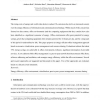Free Online Productivity Tools
i2Speak
i2Symbol
i2OCR
iTex2Img
iWeb2Print
iWeb2Shot
i2Type
iPdf2Split
iPdf2Merge
i2Bopomofo
i2Arabic
i2Style
i2Image
i2PDF
iLatex2Rtf
Sci2ools
142
click to vote
CN
2010
2010
Network virtualization in energy-efficient office environments
The rising costs of energy and world-wide desire to reduce CO2 emissions has led to an increased concern over the energy efficiency of information and communication technology. Whilst much of this concern has focused on data centres, office environments (and the computing equipment that they contain) have also been identified as a significant consumer of energy. Office environments offer great potential for energy savings, given that computing equipment often remains powered for 24 hours per day, and for a large part of this period is underutilised or idle. This paper proposes an energy-efficient office management approach based on resource virtualization, power management, and resource sharing. Evaluations indicate that about 75% energy savings are achievable in office environments without a significant interruption of provided services. A core element of this office management is a peer-to-peer network that interconnects office hosts, achieves addressing and mediation, and manages e...
Related Content
| Added | 21 Mar 2011 |
| Updated | 21 Mar 2011 |
| Type | Journal |
| Year | 2010 |
| Where | CN |
| Authors | Andreas Berl, Nicholas J. P. Race, Johnathan Ishmael, Hermann de Meer |
Comments (0)

